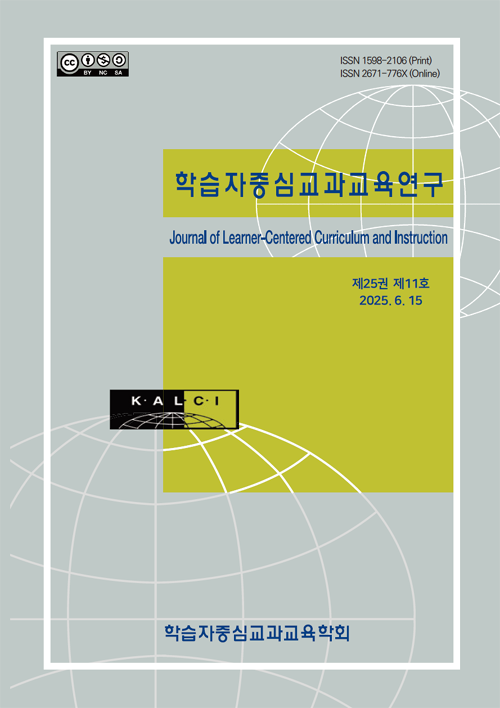은둔형 외톨이의 방어기제와 정신건강의 관계
The Relationship Between Defense Mechanisms and Mental Health in Hikikomori
- 학습자중심교과교육학회
- 학습자중심교과교육연구
- 제25권 11호
-
2025.06557 - 577 (21 pages)
-
DOI : 10.22251/jlcci.2025.25.11.557
- 62

목적 본 연구는 은둔형 외톨이 집단의 주요 방어기제를 파악하고 은둔 상태의 심리적 위험 요인인 정신건강 문제와의 관계를 분석하여 이들의 심리적 특성을 조사하고 중재 방안을 모색하는 데 그 목적이 있다. 방법 본 연구에서는 21세부터 76세 사이의 성인 300명으로부터 수집된 방어기제 질문지(K-DSQ)와 은둔형 외톨이 위험 척도(HRI)를 분석하였으며 jamovi 프로그램을 통해 기술 통계, 분산분석, 상관분석, 회귀분석을 실시하였다. 결과 분산분석 결과, 은둔형 외톨이 집단(n=77)에서 철수, 체념, 억제, 공상, 투사, 행동화, 수동공격, 분리가 유의하게 높고, 유머와 전능은 유의하게 낮았다. 그리고 전체 표본(n=300)에 대한 상관분석 결과, 정신건강 문제는 부적응적인 방어기제(미성숙한 방어, 자기 억제적 방어, 갈등 회피적 방어)와 유의한 정적 상관이 있었고 적응적인 방어기제와 유의한 부적 상관이 있었다. 그러나 회귀분석 결과, 미성숙한 방어는 은둔형 외톨이 집단의 정신건강 문제를 유의하게 예측하지 못하는 것으로 나타났다. 대신, 자기 억제적 방어는 광장 공포증, 대인 공포증, 편집증, 무기력증을 유의하게 예측하였으며 갈등 회피적 방어기제는 대인 공포증과 우울 정서를 유의하게 예측하는 것으로 나타났다. 한편, 적응적 방어는 대인 공포증 및 우울 정서의 낮은 수준과 유의한 관련이 있었다. 결론 본 연구는 은둔형 외톨이 상태가 내적 갈등과 불안을 조절하는 방어기제의 기능과 밀접한 관련이 있다는 것을 경험적으로 확인하였다는 데 의미가 있다. 이에 중재 과정에서 철수와 체념과 같은 방어기제의 사용을 줄이고 유머와 같은 적응적 방어기제를 촉진하는 전략이 필요하다고 제안한다. 이러한 결과를 바탕으로 본 연구의 한계와 시사점을 논의하였다.
Objectives This study aimed to identify the main defense mechanisms of the hikikomori group and analyze their relationship with mental health problems as psychological risk factors to investigate their psychological characteristics and explore intervention methods. Methods The Defense Mechanism Questionnaire (DSQ) and the Hikikomori Risk Inventory (HRI) were administered to 300 adults aged 21-76 years and analyzed using the jamovi program. Results ANOVA results showed that withdrawal, help-rejecting complaining, inhibition, fantasy, projection, acting out, passive aggression, and splitting were significantly higher in the hikikomori group (n=77), whereas humor and omnipotence were significantly lower. Furthermore, correlation analysis of the entire sample (n=300) revealed that mental health problems were significantly positively correlated with maladaptive defense mechanisms (immature, self-inhibiting, and conflict-avoiding defenses) and significantly negatively correlated with adaptive defense mechanisms. However, regression analysis indicated that immature defenses did not significantly predict mental health problems in the hikikomori group. Instead, self-inhibiting defenses were significant positive predictors of agoraphobia, anthropophobia, paranoia, and lethargy, while conflict-avoiding defenses were significantly associated with higher levels of anthropophobia and depressive mood. Adaptive defenses were significantly associated with lower levels of social phobia and depressive mood. Conclusions The significance of this study lies in its empirical confirmation that the hikikomori state is closely related to the functioning of defense mechanisms in regulating internal conflict and anxiety. Therefore, in the intervention process, strategies should be developed to reduce the use of defense mechanisms such as withdrawal and help-rejecting complaining while promoting adaptive defense mechanisms such as humor. The limitations and implications of this study are discussed based on these findings.
Ⅰ. 서론
Ⅱ. 연구 방법
Ⅲ. 연구 결과
Ⅳ. 논의 및 결론
참고문헌
(0)
(0)